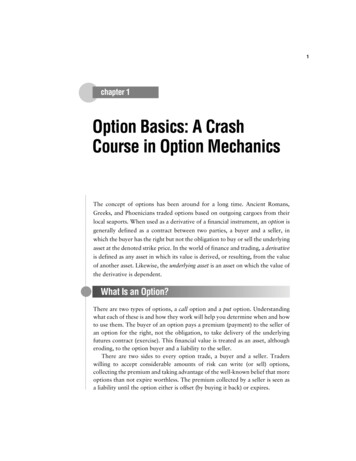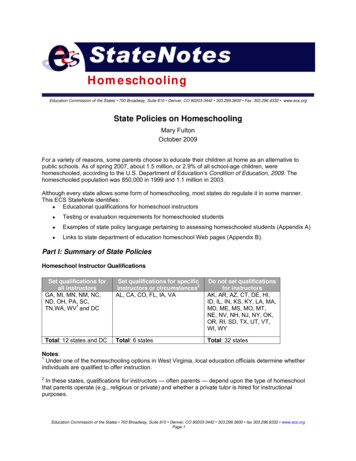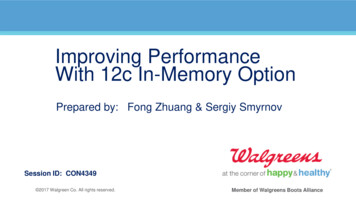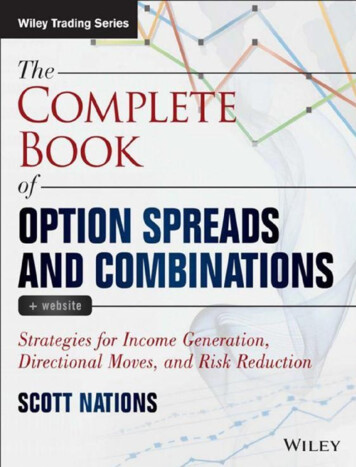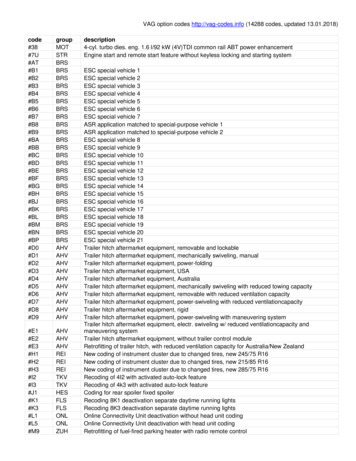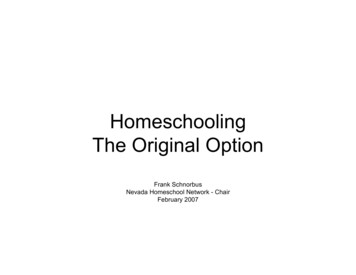
Transcription
HomeschoolingThe Original OptionFrank SchnorbusNevada Homeschool Network - ChairFebruary 2007
American Homeschool Hall of FameGeorge PattonPresident John Q. AdamsBenjamin FranklinThomas EdisonPresident John TylerPresident Thomas JeffersonPatrick HenryMark Twain2
Robert E. LeePresident George WashingtonJohn JayDouglas MacArthurPresident Woodrow WilsonBooker T. WashingtonPresident William HarrisonAnsel Adams3
President Abraham LincolnFlorence NightingaleAndrew CarnegiePresident Theodore RooseveltPresident James MadisonPresident Franklin RooseveltJohn MarshallStonewall Jackson4
Common schools were the public schools in the 19th century. Funded by localpublic funds, these schools were often one-room, one-teacher, schools. Thoughattendance was free, it was also a privilege to be able to attend. Studentsattended when they could, often interrupted by farm or other work, and resumedtheir studies in their books where they had left off.The small class size, the teacher who teaches all ages simultaneously, an emphasison educational basics, and the work pace determined by the abilities of eachstudent, are some of the factors that successful common schools and most oftoday’s homeschools share.5
There were public “common” schools, but attendance was not compulsory.The first compulsory attendance law was adopted in Massachusetts in 1852. During the next 15 years, no otherstate followed Massachusetts. But, beginning in 1867, a steady stream of states began adoptingcompulsory attendance laws and, by 1918, all states had enacted them. (The Home School Court ReportVol. XVI, No. 5)6
Various quotes from an article inThe Home School Court Report Vol. XVI, No. 5 (Sept/Oct 2000)In 1892, the national platform of the Democratic Party stated: “We are opposed to state interference with parentalrights and rights of conscience in the education of children.”The home school community brings a broader, historical perspective into the dialogue by demonstrating thateducation centering around the family unit can be as successful today as it was around the time of thedrafting of the Declaration of Independence, when literacy rates were around 97 percent.Nothing in the United States Constitution compels any state to operate public schools or to compel attendance.And of course, the Constitution nowhere empowers the federal government to take any role in education.Governor Pattison of Pennsylvania vetoed two compulsory attendance bills in 1891 and 1893 on the ground thatthey interfered with traditional parental liberties.By the early 1920s, however, all meaningful debate over the virtue of compulsory attendance had ceased. Thediscussions that continued centered on how compulsory attendance should be enforced, and for how long.7
Reasons for education laws transfering responsibility from the family to the state in the early 1900s: Americanization of immigrants Leveling between the poor and the wealthy Something for children to do after child labor laws had been passedFurman Owens, 12 years old. Can't read. Doesn't know his A,B,C's.Said, "Yes I want to learn but can't when I work all the childlabor/) Perceived success of Prussian compulsory attendance laws8
Oregon then made an effort to force attendance ONLY at public schools.Oregon, 1922 - Compulsory Education Act - “ attend a public school for the period of time a publicschool shall be held ”This law was taken to the US Supreme Court and was struck down in a landmark decision known as“Pierce”. It is this decision that prevents individual states from outlawing or over-regulating privateand home schools.“ the Act of 1922 unreasonably interferes with the liberty of parents andguardians to direct the upbringing and education of children under their control.”The court did, however, affirm that each state has an interest in theeducation of its children. All subsequent court cases have been efforts tobalance the interests of the state against the interests of the parents.9
Nevada: First in the NationAcross the country modern homeschool laws have been enacted, with Nevada thefirst, to reestablish the parental right that at one time had been taken for granted.from Home Schooling in the US: A Legal Analysis, 2004(Home School Legal Defense Association)Subsequent recent research has revealed that Nevada homeschool law actually dates back to 1947.10
Nevada Homeschool Laws1947:That the child is receiving under private or public instruction, at home or in some other school, equivalentinstruction fully approved by the state board of education as to the kind and amount thereof;1956:Attendance required by the provisions of section 363 shall be excused when satisfactory written evidence ispresented to the board of trustees of the school district in which the child resides that the child is receivingat home or in some other school equivalent instruction of the kind and amount approved by the state boardof education.Current:Attendance required by the provisions of NRS 392.040 must be excused when satisfactory written evidence ispresented to the board of trustees of the school district in which the child resides that the child is receivingat home or in some other school equivalent instruction of the kind and amount approved by the StateBoard.11
Why does homeschooling succeed?There are many reasons which include:One on one instructionParental guidance, love, and commitmentAbility for education to proceed at a pace based on the child’s abilitiesLack of distracting peer pressures during school timeOpportunities for “teaching moments” occur more frequently when the parent is the teacherAbility to change curriculums or subject areas when needed or desiredChances to “learn by teaching” with siblings, or other homeschooled children at co-opsFamily freedom from external schedules and obligationsOpportunity for the child to self-teach, to ferret out and research informationA love for learningDo restrictive regulations or laws prevent abuse or increase homeschool scores?National Home Education Research Institute conducted a study that revealed that “there was no positivecorrelation between state regulation of homeschools and the home-schooled students’ performance.”This same study found no difference in the students’ reading, total math and total language scoresbased on the teacher certifcation status of their parents.Does homeschooling cause the district to lose money that they badly need?No. A 2004 study by Nevada Policy Research Institute shows that Nevada districts realize a net gain ofbetween 25.9 and 42.7 million annually due to private and home schoolers. This study is beingpublished in the current issue of the refereed journal Home School Researcher.How many children are being homeschooled?Nationally the average is a little over 2%. In Nevada it is just under 1%, and has been slowly decreasingin the last few years. Homeschool friendly regulations enacted in 2004 have not caused a massexodus from the public schools.12
Why seek a new law? Has the old one been bad?YESThe law is vague on how regulations should be written.Nevada Regulations (NAC)Nevada Administrative Code13
NEVADA Homeschoolers ask the Legislature to update and modernize the currenthomeschool law; a law on the books since 1947.Homeschooling has proven to be successful and effective, producing dedicated andactive citizens. Protection is needed to prevent future misinterpretations of thecurrent homeschool statute and to cement into place the current homeschoolfreedoms that homeschoolers enjoy.Homeschool families and districts have endured decades of unnecessary conflictand frustration, which a homeschool friendly “protective” law would haveprevented. As always, if this new law should prove to be inadequate, thelegislature has the right, and the duty, to revisit it.14
What’s currently happening in other states?Western states with favorable homeschool laws include Alaska, Arizona, Idaho, Missouri, NewMexico, Oklahoma, Texas, Utah and Wyoming. (Note: some states define homeschools asprivate schools, and therefore not having “homeschool” laws per se, are not listed here.)Utah - Senator Mark Madsen on the new (2005) homeschool law he wrote:"Because the law was vague, it led to inconsistent and varying interpretations betweenschool districts, and even between people within school districts," he continued. "We justwanted to clarify it in favor of the parents, and let the school districts focus on educating thechildren they have the privilege of educating.”15
Nevada Homeschool Laws 1947: That the child is receiving under private or public instruction, at home or in some other school, equivalent instruction fully approved by the state board of education as to the kind and amount thereof; 1956: Attendance required by the provisions of section 3
